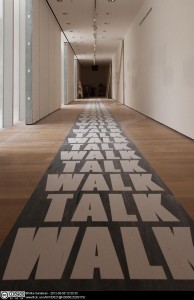 My job involves talking to people. It involves talking to people a lot. It has done for the past 11 years, really, and luckily I like talking to people.
My job involves talking to people. It involves talking to people a lot. It has done for the past 11 years, really, and luckily I like talking to people.
My job involves training, it involves persuasion, it involves rhetoric, narrative and storytelling, as I attempt to cajole people to think about changing their practice in learning and teaching, particularly with eLearning.
I use presentation skills a lot on a daily basis. I enjoy presenting, and I hope my style is generally interactive and genuinely motivational. Presentation skills can be used in one to one meetings, in small groups, in lectures, conferences etc. The skills are the same, but how we apply them in different situations differentiates what we do in any given situation.
Yesterday I was lucky enough to spend the afternoon with Michael Corbidge and Eamon (sorry I didn’t get his surname), voice coaches from the Voice and Text Department at the Royal Shakespeare Company. The session was organised by the Staff Development Unit here at Newcastle University. Michael and Eamon worked with a group of us to introduce tools and techniques to get mind and body prepared to speak publicly, and on ways to work with text to find new ways of getting meaning out of the words, to help us express and communicate the message more confidently and clearly. We worked on confidence, on being present in the moment, building those moments into a presentation, and linking them to gain momentum, and engage our audiences.
I found the afternoon fascinating.
I’ve always treated any form of public speaking or presentation as a performance. Whilst this can be scary and intimidating, it is always a chance to communicate your work (and to show off a bit). Communicating your work as best you can is an obligation of the funding we receive in higher education which allows us to do the work we do, in the institutions we do it in. I am constantly aware of how lucky I am to work in HE, of the privilege which goes in hand in hand with the responsibility I feel to use public money in the best way I can, as transparently as I can. Effective and efficient sharing and communication of ideas, outcomes and products of that public funding therefore goes hand in hand with doing the work. It isn’t an add on. It’s a fundamental part of the contract we enter into when we use public funds.
Keeping communication and presentation skills fresh and up to date is therefore, for me, an essential part of my personal and professional development. I am always looking for new ways into the content I am presenting, even if its a workshop I have delivered 50 times. I want the 51st workshop to feel as fresh, invigorating and interesting as the first. Everyone attending that workshop deserves to get as much out of it as the first people to attend.
If you have never thought about how you present yourself and your work publicly, I would urge you to go on a workshop like this. For many working in HE the techniques and tools you work with will feel alien and strange, but stick with it. I guarantee you will get a lot out of it, and so will your students, colleagues, funders and employers.
Learning to own the space you inhabit, to own the space you present in, to be present in the moment is fun and exciting, and will give you confidence and clarity in communicating your work and ideas. Even if you do get mistaken for a house manager from time to time.
